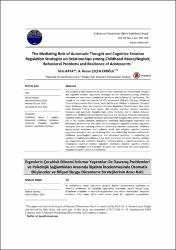The Mediating Role of Automatic Thought and Cognitive Emotion Regulation Strategies on Relationships among Childhood Abuse/Neglect, Behavioral Problems and Resilience of Adolescents
Abstract
The purpose of this research is to examine the mediating role of automatic thoughts and cognitive emotion regulations strategies on the relationship among childhood maltreatment experiences, behavioral problems and resilience of adolescents. The sample of the study has consisted of 671 adolescents (338-girl, 322-boy). Childhood Trauma Questionnaire Short Form, Youth Self Report, Children's Automatic Thoughts Scale, Resiliency Scale and Cognitive Emotion Regulation Questionnaire have been used. Research findings have shown that adaptive cognitive emotion regulation strategies and automatic thoughts have entire mediator role in relation between adolescents' childhood abuse/neglect experience and resilience. However maladaptive cognitive emotion regulation strategies and automatic thoughts have partial mediating role in the relation between adolescents' childhood abuse/neglect experience and behavioral problems. On the other hand maladaptive cognitive emotion regulation strategies have no mediating effect on relationship between adolescents' childhood abuse/neglect experience and resilience levels and adaptive cognitive emotion regulation strategies have no mediating effect on relationship between adolescents' childhood abuse/neglect experience and behavioral problems. In explaining the variance of behavioral problems, it has been found that the most effective variables are respectively the automatic thoughts, childhood abuse / neglect experiences and maladaptive cognitive emotion regulation strategies; adaptive cognitive emotion regulation strategies and automatic thoughts are respectively the most important variables to explain variance of resilience.


















